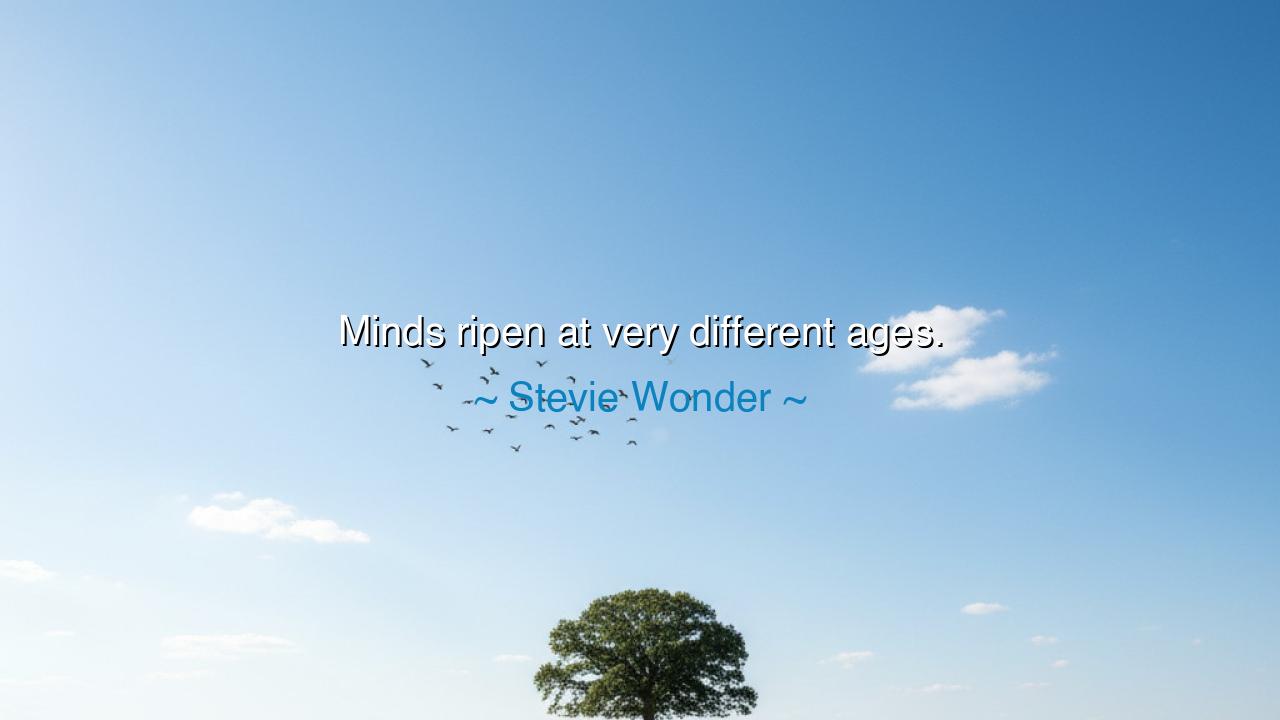
Minds ripen at very different ages.






"Minds ripen at very different ages." - Stevie Wonder. In this profound reflection, Stevie Wonder captures the essence of intellectual and personal growth—the truth that wisdom and understanding are not bound by the years we live, nor can they be measured by conventional standards of age. Just as fruits do not ripen uniformly, so too do our minds develop at their own pace, in their own time. While the world often encourages us to follow a rigid timetable of achievement and success, Wonder reminds us that true maturation of the mind occurs in its own natural rhythm. It is a process that cannot be rushed or forced, for the richness of insight often arises from the accumulation of experience, reflection, and living—and these things come to us in unique moments throughout life.
This truth is exemplified in the life of Leonardo da Vinci, who, despite being a brilliant artist and inventor from a young age, did not see the full ripening of his genius until his later years. Many of his greatest ideas, from the designs of flying machines to the exploration of human anatomy, emerged as he grew older. His mind, already sharp and inquisitive in his youth, matured into one of the most profound minds in history only after years of observation, experimentation, and failure. Da Vinci’s genius was not a product of immediate understanding, but a long, slow ripening, much like a fruit that takes time to reach its full flavor. His story illustrates Wonder's point that the maturation of the mind occurs over a lifetime, sometimes with startling bursts of insight appearing when we least expect them.
Consider the wisdom of Socrates, whose philosophical ideas did not fully come to fruition until his later years. Though he was a man of deep intellect, it was through his relentless questioning and dialogue that his mind ripened into the powerful force it became. His legacy, which endures through the ages, was built on a lifetime of introspection and engagement with the world. Socrates’ life reveals that the ripening of the mind is not about speed, but about the depth and truth of the wisdom gained. His mind did not ripen overnight, nor was it predetermined by age. It was shaped by his experiences, the lessons he learned, and the questions he dared to ask. In this way, Socrates is a testament to the idea that great minds often ripen over time, their wisdom unfolding gradually as they mature.
Stevie Wonder's insight also speaks to the natural rhythms of individuality. The world often measures success and wisdom according to conventional timelines—graduate from school at a certain age, begin a career by a certain point, achieve fame by a prescribed moment in life. Yet, minds ripen at different ages because people are not machines to be molded at the same pace. Take Benjamin Franklin, who, though an early inventor and diplomat, truly began to mature intellectually as he entered middle age. His political theories, his reflections on morality, and his experiments all flourished as he grew older and gained experience. Franklin’s life illustrates how minds ripen not according to societal expectations, but through the combination of personal growth, experience, and an enduring curiosity that follows its own timetable.
The ancient stoics, such as Seneca and Epictetus, taught that the mind’s maturation is an ongoing process. For them, the ripening of the mind was inextricably tied to the practice of virtue, self-reflection, and an unwavering commitment to wisdom over time. Seneca, in particular, wrote extensively about aging with dignity, emphasizing that the mind can continue to mature as long as it is kept sharp and focused on the principles of ethics, reason, and self-control. For the Stoics, ripening was a life’s work, one that demanded attention at every stage. Their writings remind us that, like fine wine, the best of our minds can emerge only after years of deliberate effort, patience, and growth.
Thus, the lesson to take from Wonder’s words is that our minds should not be rushed to ripen, nor should we feel burdened by the pressure to achieve wisdom or insight at any particular age. True maturity of the mind comes when we allow it to develop in its own time, embracing the lessons that come with experience, reflection, and living fully. Growth is not linear, and there is no set formula for how or when it happens. Each individual’s mind is unique, and its ripening will occur at a pace and in a manner that is suited to their journey.
In practical terms, this means embracing the process of learning at all stages of life. Just as an apple ripens on its own terms, so too should we approach our own intellectual and emotional growth with patience and curiosity. Resist the societal pressure to rush into wisdom, and instead allow yourself the time to learn, reflect, and adapt. Let every stage of life be a new opportunity to nurture your own mind, to continue growing in depth, and to share that wisdom when it is ready to be passed on to others. The ripening of the mind, as Wonder so beautifully reminds us, is a journey—one that does not adhere to external timelines but flows in the rhythm of life itself.






AAdministratorAdministrator
Welcome, honored guests. Please leave a comment, we will respond soon